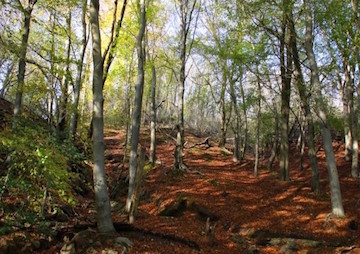Europe’s Precious Beech Forests Could Succumb to Drought
A warming climate and intense droughts are hitting some of Europe’s most coveted forest areas, with beech trees in southern Britain particularly vulnerable.
By Kieran Cooke / Climate News Network

A beech woods near Morganstown in South Wales, where tree growth rates are still affected by a drought 50 years ago. (Ben Salter via Flickr)
This piece first appeared at Climate News Network.
LONDON — Sunlight angling its way through the light green leaves of lines of beech trees is one of the most haunting features of the European spring.
But new research shows that beech forests across Europe are vulnerable to changes in climate — in particular, to the effects of prolonged dry spells.
At most risk of sudden and widespread reduced growth are beech forests in the south of the UK, an area where the species is at its most profuse.
Scientists from the University of Stirling in Scotland report in Global Change Biology that they examined the European beech (Fagus sylvatica) at 46 sites around Europe, ranging from the dry regions of central Spain, through Germany and France, and up to the wet regions of northern Scotland.
Various readings, including tree ring data, were taken, and climate data for each site was also collected, covering a time span stretching from 1950 to 2010.
Exceptionally dry
The researchers’ main aim was to evaluate how resistant the trees were to periods of extended drought, such as those in 1976 and 2004, which were exceptionally dry years throughout much of western Europe.
“These long dry spells cause sudden and widespread reduced growth within the species,” says Alistair Jump, professor of plant ecology at Stirling and lead author of the research report.
The finding of the particular vulnerability of southern UK beech forests to drought and climate change surprised Jump and his colleagues.
“We might expect beech forests in hotter and drier regions of Europe, such as southern France and Spain, to be most at risk,” Professor Jump says. “However, we have found that the south of the UK — the very centre of the area where the species grows — is most badly affected.”
“These trees at the centre of the region where the species grows are more vulnerable to our changing climate than we previously realized.”
At the other end of the species’ range, the research found that beeches in drier areas showed high resistance to drought and little evidence of drought-linked growth decline, although recovery is slow on the rare occasions when this does occur in such regions.
The researchers say that the generally low sensitivity of beeches to drought conditions in the more southerly, drier regions of Europe could be down to the species adapting itself to more arid conditions over time. Soil types and the relative water-carrying capacity of the ground round the trees could also be factors.
The area where beech forests are most drought-resistant — and recover the quickest from long periods without water — are in northern and central France and in southern Germany.
Long-lasting impact
The study found that, overall, older stands of trees are best able to cope with periods of prolonged drought, although the impact of such events can often be long-lasting.
Researchers say droughts that happened nearly 50 years ago continue to affect beech forests in the south of Wales, where trees are still growing at rates lower than normal.
“As our climate continues to warm, droughts will become more frequent and more extreme,” Professor Jump says. “Beech forests across Europe will be hit increasingly hard, with a high risk of widespread mortality when the next big dry spell hits – particularly in the southern parts of the UK.
“These trees at the centre of the region where the species grows are more vulnerable to our changing climate than we previously realised and, as a result, I would expect to see long-lasting changes to the makeup of our woodlands.”
Kieran Cooke, a founding editor of Climate News Network, is a former foreign correspondent for the BBC and Financial Times. He now focuses on environmental issues.
Your support matters…Independent journalism is under threat and overshadowed by heavily funded mainstream media.
You can help level the playing field. Become a member.
Your tax-deductible contribution keeps us digging beneath the headlines to give you thought-provoking, investigative reporting and analysis that unearths what's really happening- without compromise.
Give today to support our courageous, independent journalists.









You need to be a supporter to comment.
There are currently no responses to this article.
Be the first to respond.